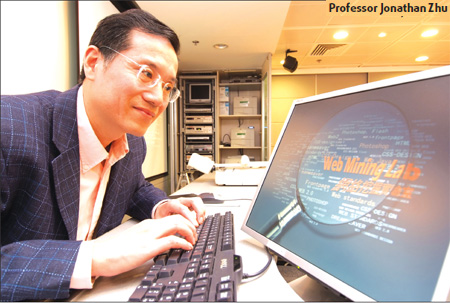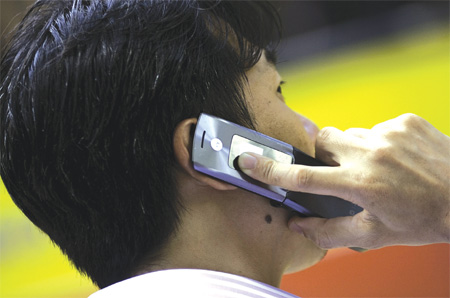Digital gaps
Updated: 2010-01-09 07:09
By Tiffany Wong(HK Edition)
|
|||||||

One irony of the Internet age is that while, on the one hand, digital and wireless technologies are clearly bridging gaps, they are also creating or exacerbating them -generational, access and cost gaps, to name key ones, Tiffany Wong reports in this second of a two-part write-up
Hong Kong boasts one of the highest rates for connectedness to the Internet and mobile technology in the world. Yet there still is a "digital divide" between those who have access to information and those who choose not to participate in the online information dialogue.
While it may be self-evident that Hong Kong, like the rest of the world, is connected to the Internet, there are generational patterns concerning those who actively engage in the digital lifestyle or eschew it, thereby widening the pre-existing generation gaps found in most industrialized countries and regions.
The learning curve
Another key gap is that between those who psychologically, financially or otherwise can and those who cannot live without advanced connectivity.
A practical Hong Kong Internet user, Nelson Wong only recently learned how to make use of the technology. At the age of 40, he fits the demographic of Hong Kong's average Internet user. Speaking from his hair salon in CITIC Tower in Admiralty, Hong Kong, where he has been a hairdresser for 20 years, Wong said that previously he avoided learning about online access: "I thought people were addicted to the Internet. They spend a lot of time on it. Even two hours per day [on the computer] is just not for me." He does not think he will become "addicted", because he restricts his use to thirty minutes per day on the computer at the hair salon that he shares with his colleagues.
"For me, I don't understand (the need of the Internet)," said Wong, adding, however, "I know how to use it and it doesn't take long to learn," suggesting that his disincentive to use the Net is a lack of motive, not opportunity.
Unlike the average Hongkonger with at least three mobile phones, he is comparatively a Luddite, given that he owns only "the same old mobile phone (he has had for some time) without 3G technology", observing that he would rather spend his time playing the piano at home.
According to Jonathan Zhu, a professor in the Department of Media and Communication and a member of the Centre for Communication Research at City University of Hong Kong (CUHK), "about 30% of the population don't use the Internet...some non-users may never join [in the usage] for a variety of personal reasons - just as in the old days, when some people never read the newspaper." It is a matter of "digital choice," he said, adding, "(it's) their conscious choice. We should not force our preferences onto them."
Broadband rankings
Professor Zhu has also noticed a counter-phenomenon among those who simply are not interested in Internet-based communication. "We have found from our surveys that the primary reason is lack of necessary knowledge or skills, followed by lack of time or interest. Lack of (technological) resources is the least important reason."
For both domestic and global strategic reasons, many regions are addressing not just a generational gap, but also an access gap. To confront this issue in the UK, the British government has launched the "Digital Britain" project in 2008 with results released this year, indicating some lag in reaching their goal to provide universal broadband access in the UK by 2012.
According to Nielsen Online, a marketing and media information company, the UK's Internet users in 2009 comprised 79.8 percent of the population - up from the 26.2 percent in 2000 reported by the International Telecommunications Union, a United Nations agency for information and telecommunication technology issues.
As for China, the growth numbers are staggering on the mainland, as the China Internet Network Information Center (CNNIC) reported that "by late June 2009, the number of mainland Internet users had reached 338 million, up 13.4 percent from late 2008 and increasing by 40 million within six months." It also cites "fast growing momentum" in mobile Internet users in rural areas of the mainland.
Hong Kong has done even better in achieving broadband access. Zhu explains that about "70 percent of adults in Hong Kong are Internet users, which is quite impressive, but still not good enough to become one of the top 20 'highly Internet penetrated' countries and regions in the world." On the other hand, he said, "Nearly every member of the adult population in Hong Kong uses mobile phones, which easily puts the territory in the top tier of mobile phone usage in the world."
Free Internet service
Of course, if Internet content (as opposed to the basic service) were completely free, the gap between users and non-users might be expected to shrink.
With the prevalence of connectivity in Hong Kong, can and should Internet content be free of charge? According to Zhu, speaking of free content, "It has become an established norm among Internet users around the world, young or old, that online content should be free." He also added that free content has the downside of being subsidized by online advertising.
"I would like to think that the Internet (content) should always be free," said Tim Ho, a Digital Strategist in 360 Digital Influence of Ogilvy PR. "Internet users would have to give up some values in some ways, such as getting even more annoying ads to keep the service free," he observed.
As a young marketing entrepreneur, artist and web designer, Ho believes that "unlike other media like television and radio, the beauty of the Internet and social media is that we can choose the information and entertainment that we want to get. If the free Internet is going to destroy it, I prefer to be charged for the service."
'Digital natives'
Another gap, one that correlates with, but is not identical to generation gaps, is that between "digital natives" and "digital immigrants".
Ho proudly claims that he is a "digital native", a term that designates "those born after Apple first introduced the Mac computer (in 1984)."
Marc Prensky, an American scholar, originally coined the terms "digital natives" (those born into a world reliant on the Internet) and "digital immigrants" (those who remember a time without the Internet) - a nomenclature that has been taken up by the "Digital Native" research project run jointly by the Berkman Center for Internet and Society at Harvard Law School and the Research Center for Information Law at the University of St. Gallen in Switzerland.
True, "digital immigrants" are more likely to cling to older analog technologies. A generation gap is still apparent, considering the widespread use of relatively out-of-date analog technology such as tape cassettes, record players, walkmans and even older forms of television technology. Commenting on these techno-relics and their lack of interactivity, Ho said, "I'm a digital native, remember? I prefer two-way rather than one-way communication." Expressing sentiments similar to those belonging to the Internet generation, he said, "I don't like information coming at me. I like to go for it. Internet sources are getting more and more trustworthy too" - a reflection of what might be called an "analog-digital gap".
While television remains popular, even though it is increasingly shifting to online formats, analog technology (tape cassettes, walkmans, VHS, record players) may be increasingly a thing of the past and worthy of revival for nothing more than nostalgia for technology-free living.
"Essencially a blogger, a Twitter user can break news quicker than other traditional media," continued Ho, admitting that he occasionally indulges in television - a medium which remains popular in Hong Kong. "I watch TV once in awhile," he said, surprisingly adding, "but only for the ads."
For those of us who remember a time of analog technology and even a time without television or the Internet, digital change is coming and moving at light speed. Indeed, life in Hong Kong revolves around technology, said this digital native, speaking of modern techno-urban life, "Nature here doesn't even allow us to hunt for food and farm our own vegetables without technology!"
|
Hong Kong has one of the highest rates of mobile telecom access in the world. Bloomberg News |
(HK Edition 01/09/2010 page3)
